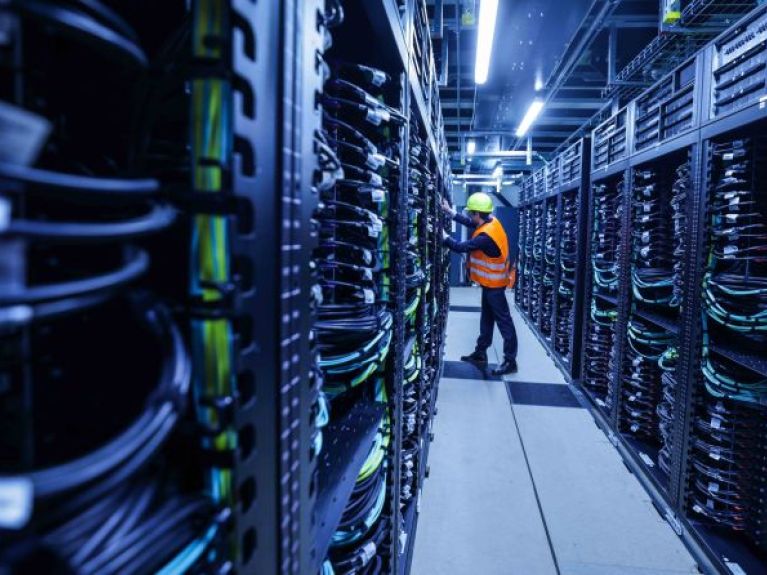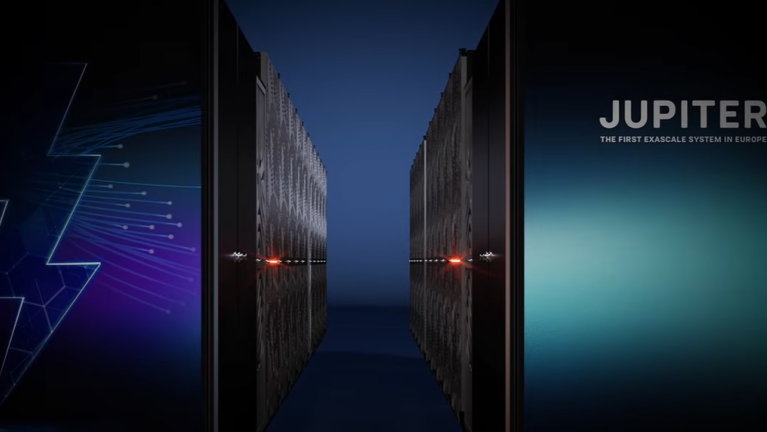Jupiter Supercomputer
Europe’s fastest computer has been built in Jülich. What makes it so special? And how much does it matter to Germany?

From above, “Jupiter” looks like a gigantic computer chip, with 24,000 high-performance computers humming away on the inside. The new supercomputer went into service in early September 2025 at the Forschungszentrum Jülich research institute. Jupiter is setting new standards, particularly when compared to other facilities in Europe. It’s the fastest computer on the continent and holds fourth place in the global ranking. Jupiter has a modular construction where a large number of individual units are connected together. Not only does this allow Jupiter to be expanded in future, but it’s also a first anywhere in the world. In addition to this, no other supercomputer in the world is as energy-efficient as this new facility in Germany.
High-performance computers like Jupiter are essential to the German economy. “From a European perspective, Jupiter is a pioneer. It demonstrates shows how we can achieve world-leading performance when we combine national vision with European collaboration,” says Henna Virkkunen, Executive Vice-President of the European Commission for Technological Sovereignty, Security and Democracy, who attended the opening ceremony in Jülich.
Jupiter is as powerful as a million smartphones and several million laptops, giving it the colossal processing power needed for applications focused on the challenges and technologies of tomorrow. Supercomputers show their full strength on tasks such as climate and weather simulations, developing sustainable energy systems, and especially in the field of training large language models (LLM) for AI. At full capacity, it takes Jupiter less than a week to train an LLM. The Director of Forschungszentrum Jülich Astrid Lambrecht expects Jupiter to give a “massive boost” to science.
Digital sovereignty
Jupiter is an important piece of the puzzle in Europe’s efforts to achieve digital sovereignty. Many businesses are calling for the creation of European AI infrastructure in order to reduce dependency on the US and China. The European Union’s “AI Continent” action plan includes measures to develop the EU’s own data and computing centres along with the use of trustworthy AI solutions – a form of operating system – to promote digital resilience in health, administration, industry and education. “Technological sovereignty and sovereign computing capacity are indispensable to our security and competitiveness in Germany and Europe,” says Federal Chancellor Friedrich Merz. The supercomputer’s modular structure has earned it the name “JUPITER AI Factory”, and the facility is almost exactly what the EU has in mind with regard to the AI gigafactories which it hopes to see set up across the continent over the next few years.
Dieses YouTube-Video kann in einem neuen Tab abgespielt werden
YouTube öffnenThird party content
We use YouTube to embed content that may collect data about your activity. Please review the details and accept the service to see this content.
Open consent formBitkom, the German body that represents digital industries, has welcomed Jupiter going online, but it still sees considerable need for more such computers. AI expert Janis Hecker says, “For all its impressive performance, JUPITER is still too small to train the next generation of AI models.” According to Hecker, huge investment would be required to train Europe’s own foundation models to the same level as the major US manufacturers. Holger Hoos, an adviser to the European Commission and AI expert at RWTH Aachen University, comes to the same conclusion. In his view, there is no way that a machine such as Jupiter could meet the demand for computing power – though he stresses that was never the plan. “It will require a massive expansion of AI computing capacity over and above Jupiter,” he explains.
Rapid expansion in the EU
Hoos is calling for rapid expansion within the EU in order to reduce dependency on others. “I consider digital sovereignty, particularly related to AI, to be a matter of the utmost importance,” he says, stressing that Europe’s ability to keep pace with the US and China is essential if Europe is to avoid finding itself facing an even more problematic dependency, particularly with regard to services and software from the US.
The level of investment in Jupiter illustrates the scale of the efforts required: with over €500m invested to build just this one supercomputer, with a quarter of the funds coming from the budget of the Federal Ministry for Research, Technology and Space Travel. Federal Research Minister Dorothee Bär says, “Thanks to its huge computing power, Jupiter will revolutionise the calculation of scientific simulations, along with the training and application of AI models on the largest scale. In this way, it is helping achieve the goal of Germany’s high-tech agenda to make AI a key technology as a major tool in vital fields of research and practical applications.”



